Abstract
Intrinsic motivation was examined in a spontaneous and natural context by observing and interviewing skateboarders as they engaged in their sport. At the same time, the flow phenomenon and its relationship to intrinsic motivation was explored. Data were collected from twenty skateboarders. Results indicated being intrinsically motivated can be a rich, subjective experience characterized by a sense of freedom, euphoria and efficacy, challenge and satisfaction. Likewise, flow is a rich, subjective experience characterized by peak performance, heightened concentration, positive affect, and transcendence.
Similar content being viewed by others
Notes
While there may be organized leagues or structured events in some regions, there were none in the province in which this study took place.
Although Hektner et al. (2007) point out that while quantitative methods have ignored the subjective experience, subjective methods have tended to lack systematic rigor (p. 4). Qualitative researchers have made significant strides in establishing systematic rigor in their work.
Approval for the consent protocol was granted by the Interdisciplinary Committee for Ethics in Human Research at Memorial University.
One of the anonymous reviewers raised the question about using a select sample, focusing only on skateboarders. Would individuals in other activities respond the same way? Studying only a single group was seen as problematic.
References
Atkinson, P., & Hammersley, M. (1994). Ethnography and participant observation. In N. Denzin & Y. Lincoln (Eds.), Handbook of qualitative research (pp. 248–261). London, UK: Sage Publications.
Bandura, A. (2001). Social cognitive theory: An agentic perspective. Annual Review of Psychology, 52, 1–26.
Bandura, A. (2006). Toward a psychology of human agency. Perspectives on Psychological Science, 1, 164–180.
Beal, B. (1996). Alternative masculinity and its effects on gender relations in the subculture of skateboarding. Journal of Sport Behavior, 19, 204–220.
Boyd, M., & Kim, M. (2007). Goal orientation and sensation seeking in relation to optimal mood states among skateboarders. Journal of Sport Behavior, 30, 21–34.
Cooper, A. (1998). Playing in the zone: Exploring the spiritual dimensions of sports. London: Shambhala.
Csikszentmihalyi, M. (1975). Beyond boredom and anxiety. London: Jossey-Bass.
Csikszentmihalyi, M. (1988). The flow experience and its significance for human psychology. In M. Csikszentmihalyi & I. Csikszentmihalyi (Eds.), Optimal experience: Psychology studies of flow in consciousness (pp. 15–35). Cambridge: Cambridge University Press.
Csikszentmihalyi, M. (1991). Flow: The psychology of optimal experience. New York, NY: Harper Perennial.
Csikszentmihalyi, M. (1997). Finding flow. New York, NY: Basic Books.
Csikszentmihalyi, M., Abuhamdeh, S., & Nakamura, J. (2005). Flow. In A. Elliot & C. Dweck (Eds.), Handbook of competence and motivation (pp. 598–608). London: Guilford Press.
Csikszentmihalyi, M., & Nakamura, J. (1989). The dynamics of intrinsic motivation: A study of adolescents. In C. Ames & R. Ames (Eds.), Research on motivation in education: Goals and cognitions (Vol. 3). Toronto: Academic Press.
Csikszentmihalyi, M., & Nakamura, J. (1999). Emerging goals and the self-regulation of behavior. In R. Wyer (Ed.), Perspectives on behavioral self-regulation (Vol. 12, pp. 107–118). London: Lawrence Erlbaum.
Deci, E., Kasser, T., & Ryan, R. (1997). Self-determined teaching: Opportunity and obstacles. In J. Bess (Ed.), Teaching well and liking it (pp. 57–71).
Deci, E., Koestner, R., & Ryan, R. (1999). A meta-analytic review of experiments examining the effects of extrinsic rewards on intrinsic motivation. Psychological Bulletin, 125, 627–668.
Deci, E., & Ryan, R. (1985). Intrinsic motivation and self-determination in human behavior. London, UK: Plenum Press.
Deci, E., & Ryan, R. (1994). Promoting self-determined education. Scandinavian Journal of Educational Research, 38, 3–14.
Deci, E., & Ryan, R. (1995). Human autonomy: The basis for true self-esteem. In M. Kernis (Ed.), Efficacy, agency, and self-esteem (pp. 31–49). New York, NY: Plenum Press.
Deci, E., Vallerand, R., Pelletier, L., & Ryan, R. (1991). Motivation and education: The self-determination perspective. Educational Psychologist, 26, 325–346.
Dupuis, M., Bloom, G., & Lougheed, T. (2006). Team captain’s perceptions of leadership. Journal of Sport Behavior, 29, 60–78.
Fischer, C., & Wertz, F. (1979). Empirical phenomenological analyses of being criminally victimized. In G. Knowles & D. Smith (Eds.), Duquesne studies in phenomenological psychology (Vol. 3, pp. 135–158). Pittsburgh, PA: Duquesne University.
Grolnick, W., Deci, E., & Ryan, R. (1997). Internalization within the family: The self-determination theory perspective. In J. Grusec & L. Kruczynski (Eds.), Parenting and children’s internalization of values (pp. 135–161). Toronto: Wiley.
Halling, S. (2008). Intimacy, transcendence, and psychology. New York, NY: Palgrave MacMillan.
Hefferon, K., & Ollis, S. (2006). “Just clicks”: An interpretive phenomenological analysis of professional dancers’ experience of flow. Research in Dance Education, 7, 141–159.
Hektner, J., Schmidt, J., & Csikszentmihalyi, M. (2007). Experience sampling method: Measuring the quality of everyday life. London, UK: Sage Publications.
Jackson, S. (1992). Athletes in flow: A qualitative investigation of flow states in elite figure skaters. Journal of Applied Sport Psychology, 4, 161–180.
Karsten, L., & Pel, E. (2000). Skateboarders exploring public space: Ollies, obstacles and conflict. Journal of Housing and the Built Environment, 15, 327–340.
Krane, V., & Baird, S. (2005). Using ethnography in applied sport psychology. Journal of Applied Sport Psychology, 17, 87–107.
Martin, J., & Cutler, K. (2002). An exploratory study of flow and motivation in theater actors. Journal of Applied Sport Psychology, 14, 344–352.
Massimini, F., & Carli, M. (1988). The systematic assessment of flow in everyday experience. In M. Csikszentmihalyi & I. Csikszentmihalyi (Eds.), Optimal experience: Psychology studies of flow in consciousness (pp. 266–287). Cambridge: Cambridge University Press.
Michell, J. (2004). The place of qualitative research in psychology. Qualitative Research in Psychology, 1, 307–319.
Moneta, G., & Csikszentmihalyi, M. (1996). The effect of perceived challenges and skills on the quality of subjective experience. Journal of Personality, 64, 275–310.
Murphy, M. (1977). Sport as yoga. Journal of Humanistic Psychology, 1977, 21–33.
Ravizza, K. (1977). Peak experiences in sport. Journal of Humanistic Psychology, 17, 35–40.
Rawsthorne, L., & Elliot, A. (1999). Achievement goals and intrinsic motivation: A meta-analysis. Personality and Social Psychology Review, 3, 326–344.
Rennie, D., Phillips, J., & Quartaro, G. (1988). Grounded theory: A promising approach to conceptualization in psychology? Canadian Psychology, 29, 139–159.
Ryan, R., & Deci, E. (2000a). Intrinsic and extrinsic motivations: Classic definitions and new directions. Contemporary Educational Psychology, 25, 54–67.
Ryan, R., & Deci, E. (2000b). Self-determination theory and the facilitation of intrinsic motivation, social development and well-being. American Psychologist, 55, 68–78.
Ryba, T. (2007). Cartwheels on ice: A phenomenological study of children’s enjoyment of figure skating. Athletic Insight, 27, 58–73.
Seifert, T. (2004). Understanding student motivation. Educational Research, 46, 137–149.
Shernoff, D., Csikszentmihalyi, M., Schneider, B., & Steele Shernoff, E. (2003). Student engagement in high school classrooms from the perspective of flow theory. School Psychology Quarterly, 18, 158–176.
Suzuki, L., Ahluwalia, M., Mattis, J., & Quizon, C. (2005). Ethnography in counseling research: Possibilities for application. Journal of Counseling Psychology, 52, 206–214.
van Etten, S., Pressley, M., McInerney, D., & Liem, A. (2008). College seniors’ theory of their academic motivation. Journal of Educational Psychology, 100, 812–828.
Voiskounsky, A., & Smyslova, O. (2003). Flow-based model of computer-hackers’ motivation. Cyberpsychology and Behaviour, 6, 171–180.
Weiner, B. (2005). Motivation from an attribution perspective and the social psychology of perceived competence. In A. Elliot & C. Dweck (Eds.), Handbook of competence and motivation (pp. 73–84). New York, NY: Guilford Press.
Wiersma, U. (1992). The effects of extrinsic rewards in intrinsic motivation: A meta-analysis. Journal of Occupational and Organizational Psychology, 65, 101–114.
Author information
Authors and Affiliations
Corresponding author
Rights and permissions
About this article
Cite this article
Seifert, T., Hedderson, C. Intrinsic Motivation and Flow in Skateboarding: An Ethnographic Study. J Happiness Stud 11, 277–292 (2010). https://doi.org/10.1007/s10902-009-9140-y
Received:
Accepted:
Published:
Issue Date:
DOI: https://doi.org/10.1007/s10902-009-9140-y




